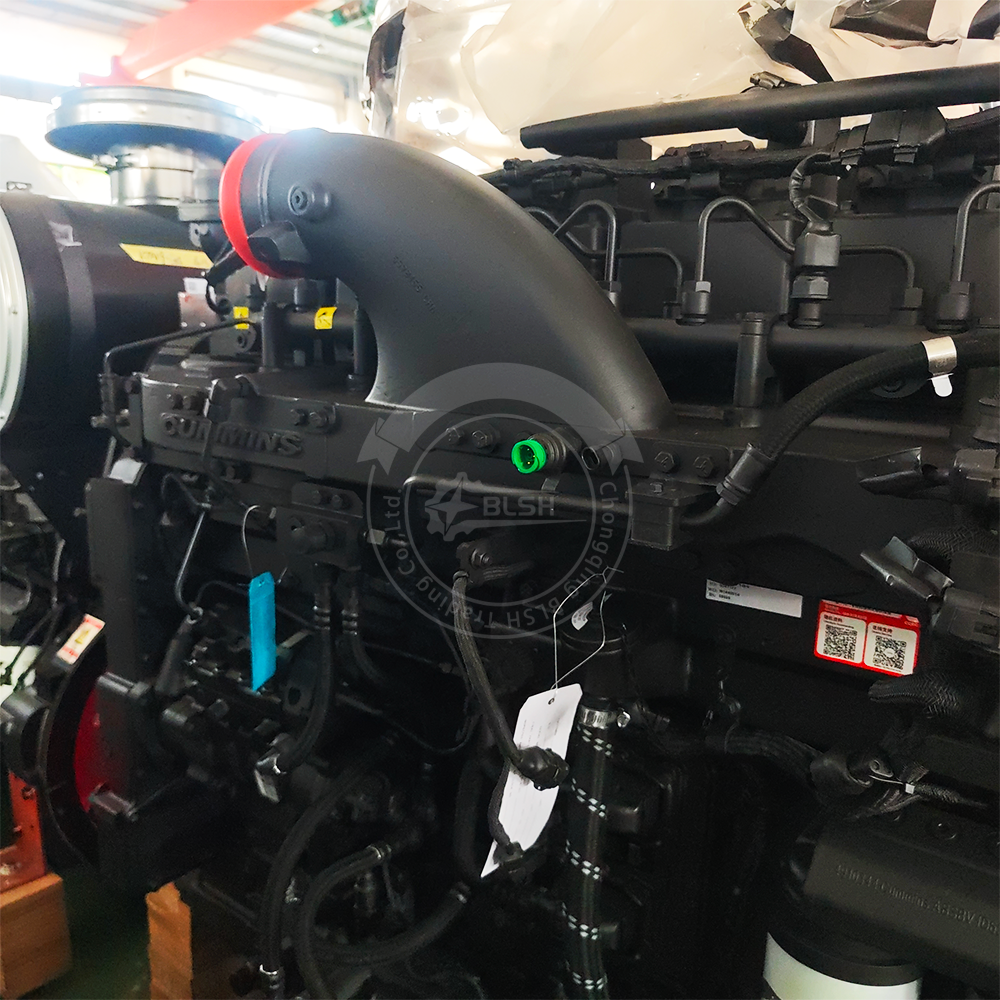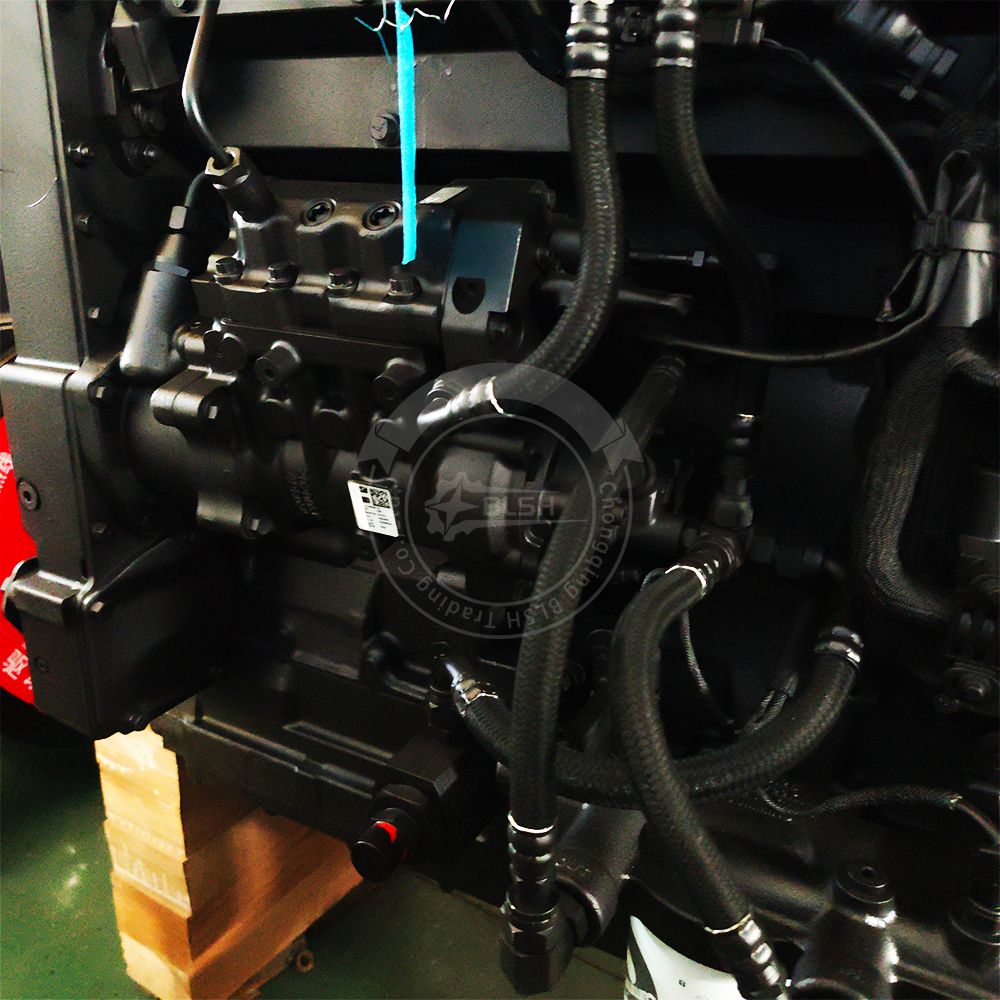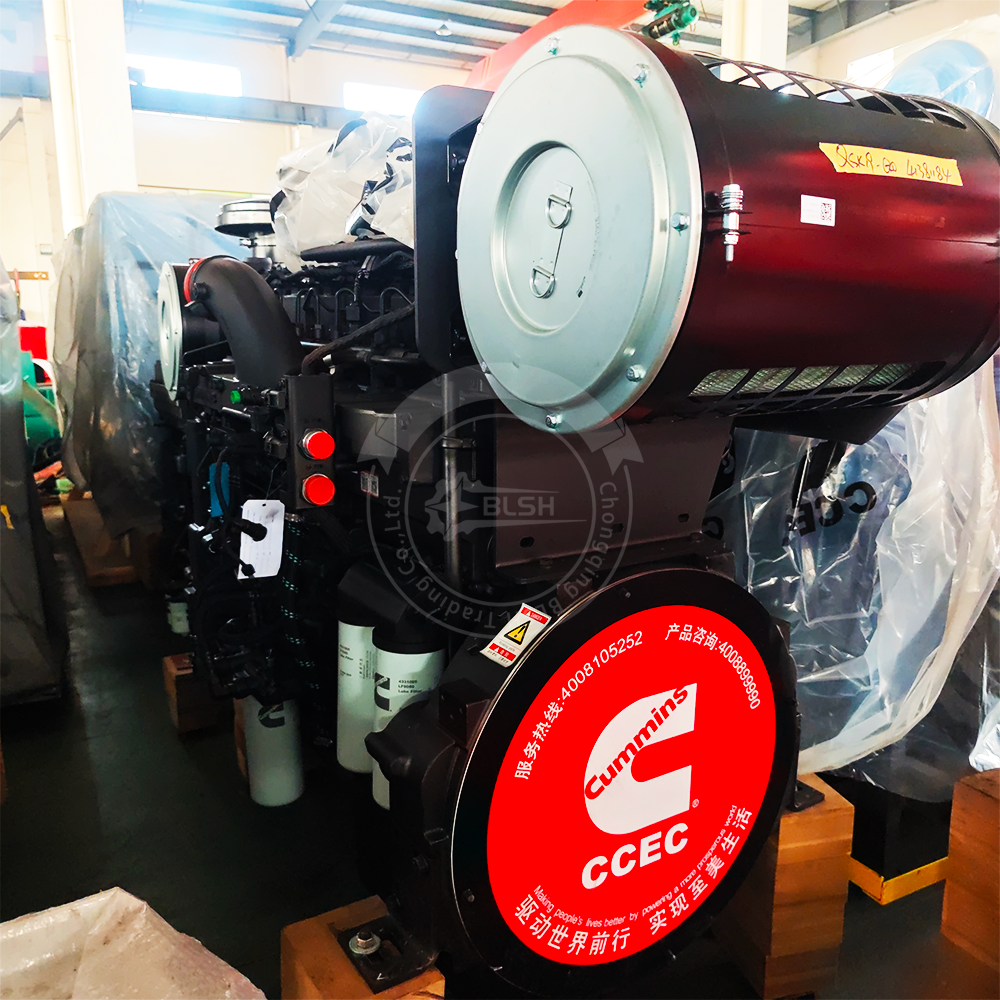CCEC QSK19-G12 Generator Engines




| Engine Model | QSK19-G12 |
| Standby Power | 758 HP (565 kW) at 1500 RPM |
| Prime Power | 675 HP (503 kW) at 1500 RPM |
| Compression Ratio | 15.0 : 1 |
| Type | 4 Cycle; 6 Cylinder |
| Fuel System | CMS MCRS |
| Aspiration | Turbocharged & Aftercooled |
| Emission Standard | Euro II |
| Displacement | 19L |
| Bore * Stroke | 159 mm * 159 mm |
| Packing Size (L * W * H) | 1695 mm * 985 mm * 1723 mm |
General Infomation of CCEC QSK19-G12 Generator Engines
| General Infomation of CCEC QSK19-G12 Generator Engine | |||
| Engine Model | QSK19-G12 | Configuration | D193103GX03 |
| Performance Curve | FR4773 | CPL | 4270 |
| Type | Four Cycle ; Inline ; 6 Cylinder | Aspiration | Turbocharged and Low Temperature Aftercooled |
| Stroke * Bore | 159 mm * 159 mm / 6.25 in * 6.25 in | Displacement | 1150 in3 / 18.9 L |
| Compression Ratio | 15.0 : 1 | Fuel System | CMS MCRS |
| Date | 2-Aug-19 | Emission Compliance | EPA Tier 2 |
| Prime Power & Engine Speed | 675 HP (503 kW) at 1500 RPM | Continuous Power & Engine Speed | 670 HP (500 kW) at 1500 RPM |
| Standby Power & Engine Speed | 758 HP (565 kW) at 1500 RPM | Aftertreatment | 0 |
| Installation Data of CCEC QSK19-G12 Generator Engine | |||
| Wet Weight (Approximate) | 4350 lb / 1973 kg | ||
| Moment of Inertia of Rotating Components – with FW 4023 Flywheel, SAE 0 | 195.0 lbm.ft2 / 8.2 kg.m2 | ||
| Center of Gravity from Rear Face of Block | 23.6 in / 598.2 mm | ||
| Maximum Static Loading at Rear Main Bearing | 2000 lb / 907 kg | ||
| Dry Weight (Approximate) | 4190 lb / 1901 kg | ||
| Maximum Bending Moment at Rear Face of Block | 1000 lb.ft / 1356 N.m | ||
| Center of Gravity Above Crankshaft Centerline | 11.1 in / 281.9 mm | ||
| Aftertreatment Weight (Approximate) | N/A | ||
Engine Performance Data CCEC QSK19-G12 Generator Engines
| Performance Data of CCEC QSK19-G12 Generator Engine | |||
| STANDBY | PRIME | CONTINUOUS | |
| Frequency | 50 Hz | 50 Hz | 50 Hz |
| Governed Engine Speed | 1500 RPM | 1500 RPM | 1500 RPM |
| Gross Engine Power Output | 758 HP / 565 kW | 675 HP / 503 kW | 670 HP / 500 kW |
| Brake Mean Effective Pressure | 347 psi / 2393 kPa | 309 psi / 2131 kPa | 307 psi / 2117 kPa |
| Friction Power | N/A | N/A | N/A |
| Intake Air Flow | 1685 ft3/min / 796 L/s | 1514 ft3/min / 715 L/s | 1540 ft3/min / 727 L/s |
| Exhaust Gas Temp | 957 °F / 514 °C | 954 °F / 513 °C | 943 °F / 507 °C |
| Exhaust Gas Flow | 4246 ft3/min / 2004 L/s | 3823 ft3/min / 1805 L/s | 3857 ft3/min / 1821 L/s |
| Air : Fuel Ratio | 26.8:1 | 27:01:00 | 27.6:1 |
| Radiated Heat to Ambient | 3292 BTU/min / 58 kW | 2934 BTU/min / 52 kW | 2921 BTU/min / 52 kW |
| Heat to JW Radiator | 12770 BTU/min / 225 kW | 11434 BTU/min / 202 kW | 10801 BTU/min / 190 kW |
| Heat to Exhaust | 29717 BTU/min / 523 kW | 26587 BTU/min / 468 kW | 26618 BTU/min / 469 kW |
| Heat to Fuel | N/A | 0 / 0 | 0 / 0 |
| Heat to Aftercooler Radiator | 9361 BTU/min / 165 kW | 7636 BTU/min / 135 kW | 7741 BTU/min / 137 kW |
| Charge Air Flow | 120 lb/min / 55 kg/min | 108 lb/min / 49 kg/min | 110 lb/min / 50 kg/min |
| Turbo Comp Outlet Pressure | 38.9 psi / 269 kPa | 34 psi / 235 kPa | 34 psi / 235 kPa |
| Turbo Comp Outlet Temp | 431 °F / 222 °C | 396 °F / 203 °C | 395 °F / 202 °C |
System Technical Data of CCEC QSK19-G12 Generator Engines
| System Technical Data of CCEC QSK19-G12 Generator Engine | ||
| Exhaust System | Max Allowable Static Bending Moment @ Exhaust Outlet Flange | N/A |
| Max Back Pressure at Standby Power (Exhaust Outlet) | 0 in Hg / 0 kPa | |
| Air Induction System | Max Air Temperature Rise Over Ambient At Compressor Inlet | 0 °F / -18 °C |
| Max Intake Air Restriction – With Normal Duty Air Cleaner and Clean Filter Element | 10.0 in H2O / 2.5 kPa | |
| Max Intake Air Restriction – With Heavy Duty Air Cleaner and Clean Filter Element | 0 in H2O / 0 kPa | |
| Max Intake Air Restriction – With Dirty Filter Element | 25.0 in H2O / 6.2 kPa | |
| Cooling System | Jacket Water/ High Temperature Circuit Requirements | |
| Max Coolant Friction Head External to Engine (1500 RPM) | 11.0 psi / 75.8 kPa | |
| Engine Water Flow at Stated Friction Head External to Engine: 1 psi Friction Head (1500 RPM) | 162 US gpm / 613 L/m | |
| Engine Water Flow at Stated Friction Head External to Engine: Maximum Friction Head (1500 RPM) | 145 US gpm / 549 L/m | |
| Coolant Capacity – Engine High Temperature Circuit | 11.0 US gal / 41.6 L | |
| Minimum Pressure Cap Rating at Sea Level | 15.0 psi / 103.4 kPa | |
| Max Static Head of Coolant Above Crankshaft Centerline | 60.0 ft / 18.3 m | |
| Max Coolant (Top Tank) Temperature for Standby/Prime Power | 220/212 °F / 104/100 °C | |
| Thermostat (Modulating) Range | 181-203 °F / 83-95 °C | |
| Low Temperature Circuit (LTC) Requirements | ||
| Max Coolant Friction Head External to Engine (1500 RPM) | N/A | |
| Aftercooler Water Flow at Stated Friction Head External to Engine: psi Friction Head (1500 RPM) | N/A | |
| Aftercooler Water Flow at Stated Friction Head External to Engine: Maximum Friction Head (1500 RPM) | N/A | |
| Max Coolant Temp into LTC @ 77 °F (25 °C) Ambient | 0 °F / -18 °C | |
| Max Coolant Temperature into LTC @ Limiting Ambient Conditions for Standby/Prime Power | 0 °F / -18/ -18 °C | |
| Thermostat (Modulating) Range | 0 °F / -18 °C | |
| Coolant Capacity – Engine Low Temperature Circuit | N/A | |
| Charge Air Cooler Requirements | ||
| Max Allowable Pressure Drop Across Charge Air Cooler and OEM CAC piping (1800 RPM) | 3.0 in Hg / 10 kPa | |
| Max Charge Air Cooler Outlet to Ambient at 77 °F (25 °C)(CAC dT) | 38 °F / 21 °C | |
| Max CAC Outlet Temperature at <=25 °C (77 °F) Ambient | 115 °F / 64 °C | |
| Lubrication System | Oil Pressure at Minimum Idle Speed | 20 psi / 138 kPa |
| Oil Pressure at Governed Speed | 40 – 60 psi / 276 – 414kPa | |
| Max Oil Temperature | 250 °F / 121 °C | |
| Oil Capacity : Low – High | 17-19 US gal / 64-72 L | |
| Total System Capacity (with Spin-On Filters) | 22 US gal / 84 L | |
| Fuel System | Max Allowable Fuel Supply Restriction at Stage 1 Filter Inlet | N/A |
| Max Allowable Head on Injector Return Line – (Consisting of Friction Head and Static Head) | 10.0 in Hg / 33.8 kPa | |
| Max Fuel Inlet Temperature | 160 °F / 71 °C | |
| Max Supply Fuel Flow | 120 US gph / 454 L/hr | |
| Max Return Fuel Flow | 75 US gph / 284 L/hr | |
| Electrical System | System Voltage | 24 volts |
| Minimum Recommended Battery Capacity – Cold Soak @ 0 °F (-18 °C) | 900 CCA | |
| Max Starting Circuit Resistance | 0.002 ohm | |
| Max Current Draw of the System amps | 35 amps | |
| COLD START CAPABILITY | Unaided Cold Start – Minimum Cranking Speed | 150 RPM |
| Unaided Cold Start – Minimum Ambient Temp for Unaided Cold Start | 10 °F / -12 °C | |
| Performance Data | Minimum Low Idle Speed | 700 RPM |
| Maximum Low Idle Speed | 0 RPM | |
CCEC QSK19-G12 Generator Engines Product Advantages
Outstanding Performance
Equipped with the world-leading high-pressure common rail fuel system and fully electronic control modules, the engine achieves exceptional power and transient response through ultra-high fuel injection pressure, optimized vortex and harmonic intake ports, and Cummins’ proprietary high-pressure-ratio efficient turbocharger. It demonstrates enhanced adaptability to altitude, temperature, and load variations.
Features high torque, robust power, rapid transient response, and superior fuel efficiency.
Excellent Durability
The cylinder block and cylinder head are designed with high-strength integration to minimize failure rates, ensuring long-lasting reliability and an outstanding reputation.
The pre-lubrication system, Centriguard centrifugal filter, CENTINEL continuous oil renewal system, and dual-stage Fleetguard combination oil filter extend maintenance intervals while reducing startup failure rates.
High Reliability
Modular integration, compact structure, low failure rates, reduced vibration, and low noise. The engine maintains optimal performance across varying altitudes and load conditions.
Emission Compliance
An optimized combustion chamber design enables the engine to achieve exceptional emission levels without requiring aftertreatment systems. It has been certified under China’s National Stage III Emission Standard for non-road applications.
Convenient Maintenance
The INSITE engine monitoring and diagnostics software, based on the Windows operating system, offers a user-friendly interface and flexibility for rapid fault diagnosis.
A modular design with compact, block-based integration ensures easy disassembly and component reuse. Shared components across the platform enhance parts commonality.
Six-cylinder single-head integrated design with modularized structure ensures compactness. Components are detachable and highly reusable.

